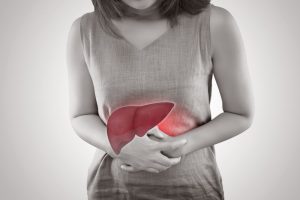
Specific Signs and Symptoms of Liver Cancer
The symptoms of liver cancer can vary from one person to the next, and any one of these symptoms may be caused by other conditions. While it is also true that liver cancer symptoms are more common in later stages, some patients can develop them earlier. If you notice any of the following signs and symptoms, it is important to consult with a doctor as soon as possible so that they can determine a diagnosis and the best course of treatment.
Common early warning signs of liver cancer include the following:
- Abdominal pain
- Jaundice (yellowing of skin and eyes)
- Abdominal swelling (ascites)
- Enlarged liver (hepatomegaly)
- Unexplainable weight loss
- Fatigue
Other symptoms of liver cancer can include:
- Nausea
- Fever
- Dark urine
- Pale or chalky stools
- Easy bruising or bleeding
- Loss of appetite
- Itchy skin
Some liver tumors in the liver also produce hormones that act on other organs, which can cause:
- Hypercalcemia (high blood calcium levels), leading to nausea, confusion, constipation, weakness, or muscle problems
- Hypoglycemia (low blood sugar), leading to fatigue and fainting
- Gynecomastia (breast enlargement)
- Shrinkage of testicles
- Erythrocytosis (elevated red blood cell count), leading to redness and flushing
- Hypercholesterolemia (high cholesterol levels)
If you’ve been diagnosed with secondary liver cancer, schedule a consultation with our team at USA Oncology Centers today. Our industry-leading interventional oncologists are waiting for your call (855.870.4747) and ready to answer any of your questions about treatments offered.
disclaimer+++
The information in blog articles is for information purposes only. The content is not intended to be a substitute for professional medical advice, diagnosis, or treatment. Please always consult a licensed healthcare professional for advice on any specific medical condition or any changes to your healthcare decisions.
